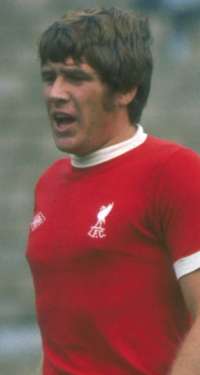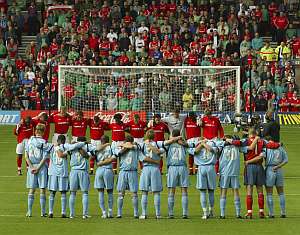The time is, of course, the time at which the armistice was signed, at the end of the First World War. It is a gesture of respect, to perpetuate the memories of a terrible waste of human life.
Quite rightly, the concept has been extended to include silences to mark certain particularly tragic events. Inevitably, this extends to silences at football grounds. So let me say at the outset that I am certainly not opposed to the idea of the minute’s silence in principle. To start giving examples is a little trite – it’s a very difficult line to draw as to what is worthy and what is not – but it would, I suspect, be uncontroversial to suggest that disasters such as Hillsborough and the
But unfortunately, it’s surely gone too far.
Rarely does a Saturday afternoon – or any other matchday - pass without a minute’s silence in honour of someone or other. On Tuesday night it was for Emlyn Hughes, who I never saw play but understand to have been a damn good player in his time, and, so we are told by all who knew him, happened to be a very decent bloke as well. His death, at a comparatively young age, is certainly very sad.
Yet was his death really deserving of a minutes silence at
Equally, I don’t want to belittle the death of Brian Clough, who although something of a maverick, was remarkably successful for at least the greater part of his managerial career. And undoubtedly, it is appropriate that the clubs with which these stalwart figures were associated – and I include in that list Bill Nicholson, who didn’t receive a minute’s silence at
For all the characters who are granted a universal minute’s silence, there’s a litany of characters who have not been given the monument. They may have been more peripheral characters, or they may have ploughed their furrows at a lower level – but their contributions to the club or clubs they served is no less valuable. Moreover, there may be supporters who gave up their time to their club for half a century or more without recompense, who contributed as much if not more than any player or manager. They may not have had the glamour or ability of those icons of the game, but are their lives any less deserving of recognition?
The trouble is, that now, should the death of a leading light of the game not be granted a silence, it could be construed as a slight. But it should not come to that. The whole point of a minute’s silence is that it marks a particularly momentous or tragic event. Football must be careful that it does not abuse the concept and overdo it. Otherwise, the only fair step would be to have an arbitrary minute’s silence in honour of all those to have departed in the previous week.
Like I say, this is certainly not an attack on football’s capacity for sentiment. I’ve said many times that this is one of the enduring and endearing features of the game, and that the game will be the poorer for it should we lose that feature. In many ways, it’s ironic that we have this proliferation of silences at a time when many of footballs traditions are under threat in the modern game.
And if there is a minutes silence, then of course it should be observed
impeccably. If a man is to be so remembered, he should be given the dignity of respect.
But I just believe we must be careful. The more they occur, the less they mean. And once they become meaningless, then we might as well not bother at all – for anything. Now that really would be a sad day.
